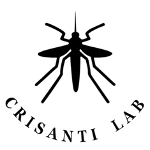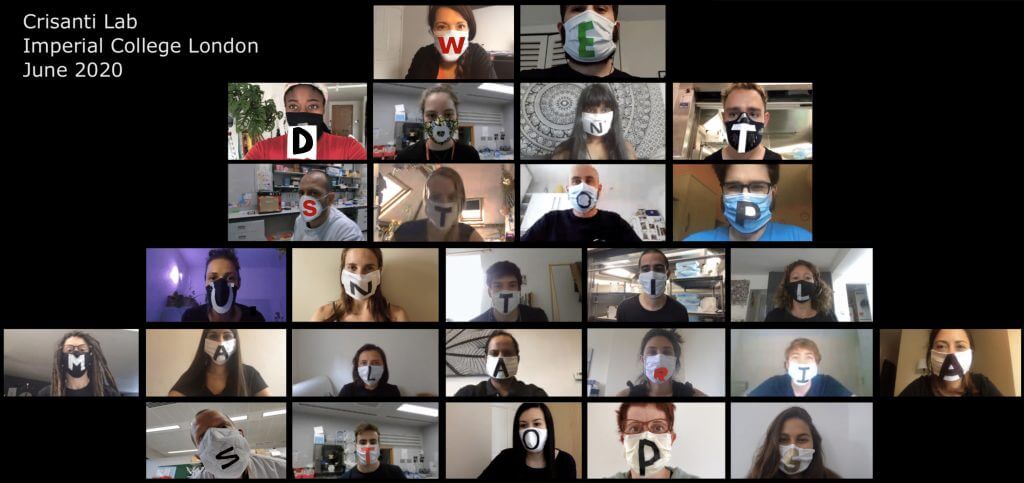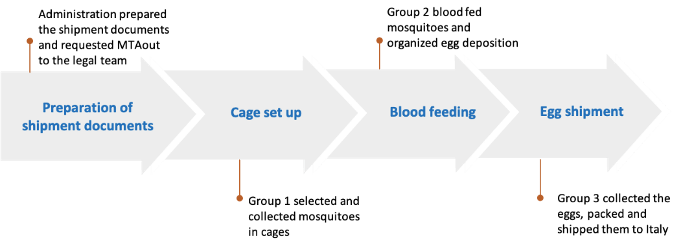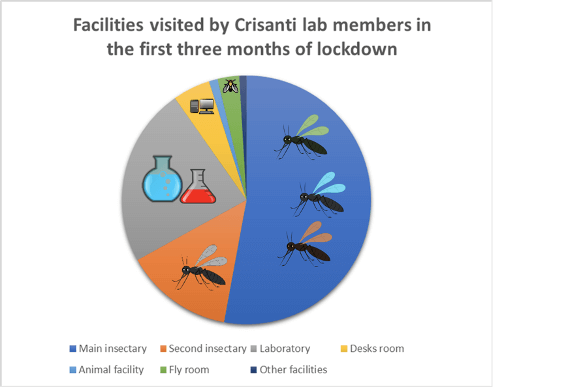Crisanti lab on lockdown

The Crisanti lab has been accustomed to facing difficult and unexpected situations threatening our mosquito colonies, such as drastic failures in the system that controls temperature and humidity in the insectary, and the spread of microsporidia infections. We never would have imagined that a pandemic was next on the list!
In response to the COVID-19 crisis, on 18th March 2020, Imperial College announced that only essential research and operational activities would be permitted, and that building access would be restricted. Gone were the days of a 22-strong team of researchers; new regulations stipulated no more than 5-6 people in the insectary facility and a mandatory two-week quarantine for those showing COVID-19 symptoms.
Thankfully, the Crisanti lab was prepared: in February, as the virus hit the UK, we had put together a science-saving plan with military precision.

Insectary
Prior to the lockdown, our team was running experiments on 153 different strains of Anopheles gambiae and Anopheles arabiensis mosquitoes, most of which had been delicately engineered to contain transgenes.
Given the new restrictions, we had to adapt our work routine. To prioritise the most essential research, we took the difficult decision to cull a total of 52 strains, representing years of hard work. This left 101 strains to be cared for by just five researchers each day – more than three times the usual workload. All insectary-based experiments were brought to a halt, save for the few essential experiments that had been ongoing for months, even years, and were close to completion.
We organised ourselves into three groups of six – four handling the main mosquito facility, and one lone ranger in the other to keep the base colonies alive. Realising the risk of falling ill, we kept a “Jolly” (Italian for Joker) at home, to be ready at a moment’s notice. We realised that the risk of infection spreading from one group to another could be a disaster to the plan. So, like Michael Jordan and the ‘95 Bulls, each group was fixed with a carefully crafted roster of well-seasoned seniors and energetic rookies. Each group follows a 1-week shift routine, which minimises the exposure of lab members to travel risks they may encounter and ensures a 2-week recovery time in case of contagion. Although members of different groups never meet, insectary activities are coordinated by the whole team daily through online working platforms.
Egg shipment mission
In order to pursue some important experiments with collaborators in Italy, the team was involved in the shipment of four mosquito strains. Each group helped to run this operation smoothly during their shift week, starting from Group 1 preparing the cages containing the adult mosquitoes, Group 2 blood feeding the females of each line and preparing them for laying eggs, and Group 3 collecting and packing eggs ready to be shipped on the same day of the collection. In parallel, all the documents for shipment were prepared including the Material Transfer Agreement (MTA) from the Imperial legal team.

Laboratory
As we had anticipated, the government advised against all non-COVID related lab work from the 18th of March onwards – impacting mostly the final year PhD students who needed time to complete their doctoral research. We used this time to carefully plan future experiments, write up research papers, and to discuss each other’s research through virtual meetings. As of the 3rd of June, lab work has resumed under new guidelines allowing up to 20% research capacity. Before lab work started again, we had implemented a daily tracking system and comprehensive plan of action to track symptoms, minimise potential contacts, and allow rapid contact tracing. Here you can see the facilities that our lab members have been working in over the lockdown, so far:

Daily meetings and activities
The lockdown has impacted our lives in more ways than we could have imagined and can cause a heavy burden on mental health. The Crisanti lab team has a reputation for being a close-knit group of friends, with talented chefs, dancers and even a football team. What we lack in physical connectivity we make up for in creativity: the team now boasts a whole host of (geeky) virtual activities including coding club, cloning club and a sweaty fitness class where baked beans and broomsticks replace dumbbells and multigyms.
We wish that the end of the pandemic arrives soon, but we don’t stop until malaria stops.
